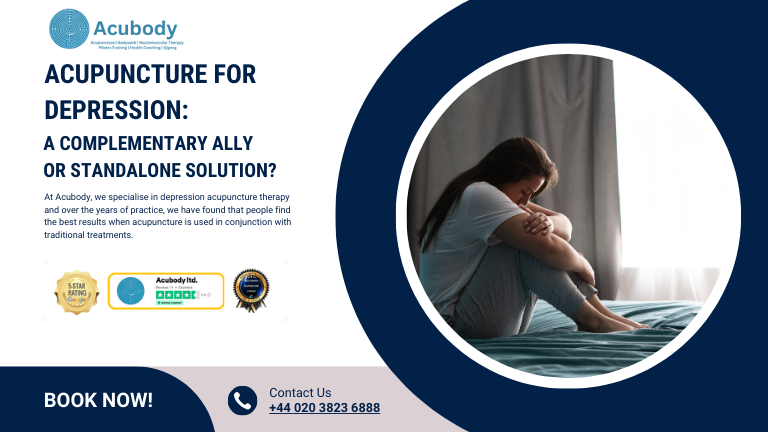Millions of people worldwide are affected by depression, which is a serious mental health condition. Whilst traditional treatments like therapy and medication often offer relief, you might seek complementary approaches.
Recently, acupuncture has gained a lot of attention for its potential in managing depression. But can acupuncture be a standalone solution, or is it best used as a complementary therapy? Let’s find out!
Understanding acupuncture for depression
Acupuncture involves inserting thin needles into specific points on the body, known as acupoints. The theory behind acupuncture is that it helps to balance the body’s energy flow or qi. Acupuncture works in several ways to treat depression:
- Reducing stress and anxiety: Acupuncture has been shown to reduce stress hormones like cortisol, which can contribute to feelings of depression.
- Improving sleep quality: Sleep disturbances are common in depression. Acupuncture may help regulate sleep patterns, leading to improved mood and overall well-being.
- Balancing neurotransmitters: Some studies suggest that acupuncture may influence the levels of neurotransmitters, such as serotonin and dopamine, which play a crucial role in mood regulation.
- Promoting relaxation: The process of acupuncture itself can induce a state of relaxation, which can be beneficial for individuals with depression.
For depression acupuncture therapy, the pressure points are:
- HT 7 – Found on the inner wrist crease, stimulating this point relieves stress and anxiety related to depression and calms the mind.
- LV 3 – Found on top of the feet between the big toe and the second toe, stimulating this point helps alleviate depression, headaches and insomnia.
The other acupuncture points for depression are CV4, MNH3, ST36, SP6, and HT6.
Is acupuncture for depression a standalone solution?
At Acubody, we specialise in depression acupuncture therapy and over the years of practice, we have found that people find the best results when acupuncture is used in conjunction with traditional treatments.
Acupuncture is a valuable tool for managing symptoms, reducing side effects, and improving the overall quality of your life.
It is also essential to note that in severe cases of depression, professional medical treatment and medication might be necessary.
Conclusion
Acupuncture is a promising complementary approach for individuals battling depression. Through the stimulation of specific points in the body, acupuncture aims to balance the qi and alleviate stress, anxiety, and insomnia, which results in depression.
If you are considering acupuncture for managing your symptoms, schedule an appointment with Acubody. Our experienced therapists will work with you to formulate a personalised treatment plan.








